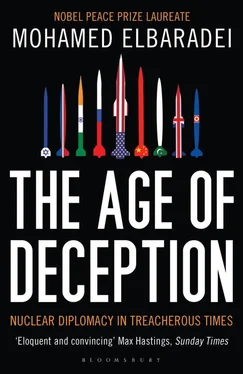In early June, I saw Shukri Ghanim, the Libyan prime minister and later the minister of oil, at a conference in Talloires, France. We had been friends since his days as director of studies at the OPEC offices in Vienna. He wanted to bring someone to see me in Vienna: Saif al-Islam al-Gaddafi, Colonel Gaddafi’s second-oldest son, who had been in charge of arranging the Libyan deal with the Americans and the British.
When they came to my house in Vienna, Ghanim introduced Saif and then left. It was soon clear that Saif was seeking perspective and advice on a broad range of topics. He began by asking how the Libyans were perceived in the United States and in the West in general.
I saw no point in sugarcoating the truth. “They have no trust in you whatsoever,” I told him. “You will have to build confidence over time.” On the other hand, I said, the Libyans were now demonstrating the seriousness of their intent to take the country in a new direction as a responsible member of the international community. As such, they would be in a position to ask for assistance in terms of education, finance, and other areas of national need.
Saif remarked on Libya’s dearth of experienced and well-trained managers in the inner circles of government. It was a recurring theme. I advised him to send some of Libya’s midlevel managers abroad for training or to import a managerial training course to Tripoli, with external assistance, to begin addressing this deficiency. The damage to Libya’s infrastructure would only be harder to reverse as more time passed.
I realized that Libya’s isolation in recent decades had taken a severe toll. In 1964 there had been a direct, nonstop flight between New York and Tripoli, which was then considered a cosmopolitan Mediterranean capital. In 1970, Sheikh Zayed bin Sultan al-Nahyan, at that time president of the Emirates, had come to Libya to get a loan and to have surgery. Since then, the Emirates had evolved into an economic powerhouse, whereas Libya had experienced steady decline.
Gaddafi’s style as head of state was, to say the least, singular. At one point he had banned barbershops in Libya, because he had decided it was not a productive profession. For an interim period, Libyans had been compelled to cut their own hair or to meet their barbers in secret locations.
His treatment of world leaders also gained attention. I heard a story that when Kofi Annan paid a visit to Libya, Gaddafi, displeased at recently imposed UN sanctions, announced he would meet Kofi in a tent in the desert in the middle of the night. Gaddafi’s entourage drove Kofi to the meeting in a roundabout way, on a pitch-black road, for a couple of hours. The quiet of the night was disrupted periodically with noises from animals Kofi could not see. Another story was of Jacques Chirac’s first visit to Libya in November 2004. He, too, was brought to a tent for his meeting with Gaddafi. Cleaners came to vacuum the tent while the discussion was taking place, and later a goat came wandering in. The point of such antics, if true, was not exactly clear. Presumably it was to signify displeasure with certain UN or French policies or to make clear that Gaddafi did not subscribe to external protocols for hosting such dignitaries.
In any case, the consequences of Libya’s years of isolation and global inexperience continued to be in evidence—whether in its lack of well-trained managers, its lack of modern infrastructure, or its unique domestic and foreign policies—as Western governments and companies swooped in to scoop up the country’s assets.
As I continued to observe Libya’s reemergence on the international scene, I was disturbed by a number of insights. First, I was confounded by the ease with which a somewhat isolated country—under international sanctions and with relatively minimal scientific and industrial sophistication—could nonetheless acquire weapons of mass destruction, including the rudiments of a nuclear weapons program.
Second, I found it disconcerting to see the eagerness of some in the international community to apply a “quick fix” to such a situation. In Libya, as elsewhere, the motivations and conditions that gave rise to a clandestine nuclear program developed over decades. These motivations cannot be transformed or eradicated by one agreement—much less through hastily conceived sanctions, a quick bombing campaign, or sporadic bouts of diplomacy. Removing dangerous equipment and material is only the first stage of a complex process. Meaningful change, in such cases, requires a commitment for the long haul—commitment to a relationship based on mutual respect and trust. Libya’s relative success at achieving such a relationship with its key international partners will only be understood over time.
Finally, I again was disquieted by the willingness of multiple parties to deceive or withhold information, in blatant contravention of international commitments: Libya, by pretending to be a party to the NPT in good standing while developing secret WMD programs; and the United States and the United Kingdom, by withholding information about clandestine nuclear activity until it suited them to reveal it to the IAEA, and then to inflate its importance to score political points. How much of this behavior would the international community tolerate, I wondered, before the integrity of the entire NPT regime would be called into question?
7
THE NUCLEAR BAZAAR OF A. Q. KHAN
The revelation of the A. Q. Khan network marked the third in a series of profound changes to the nuclear status quo. The first had appeared in the early 1990s: the emergence of countries such as Iraq and North Korea, both party to the NPT, that deliberately and secretly violated their obligations. Libya was only the latest example.
The second change dates back to the terrorist attacks in the United States on September 11, 2001, which prompted the recognition that not just states but extremist groups were in the market for radioactive material. For nuclear experts, the sophistication of the 9/11 attacks sounded an alarm: what if an extremist group were to gain access to powerful radioactive sources to construct a “dirty bomb”? [1] A dirty bomb is very different from a nuclear weapon. Officially referred to as a “radiological dispersal device,” a dirty bomb would consist of conventional explosives packaged with nuclear or radioactive material. Because a dirty bomb is much simpler to construct than a nuclear weapon, and because radioactive material is generally less well protected than weapons-grade nuclear material, the likelihood of a dirty bomb being used by terrorists is generally considered much higher than that of a nuclear weapon. Some experts have expressed surprise that a dirty bomb has not been used to date.
Or worse: what if they were to obtain enough nuclear material to construct a crude nuclear weapon? This risk escalated when evidence came to light of Al-Qaeda’s ambition to acquire WMD.
The international community responded with a dramatic reevaluation of how countries protect their nuclear facilities and radioactive material. Within months, the IAEA’s annual nuclear security budget jumped from $1 million to $30 million, funded mostly by voluntary contributions. The IAEA dispatched missions to track down orphaned radioactive materials left behind in the Republic of Georgia and elsewhere in the former Soviet Union. Physical security measures were upgraded at nuclear power plants, research reactors, and other facilities worldwide. Scenarios for the potential sabotage of nuclear facilities were reevaluated.
The response to the threat was not uniform. Western governments and even nongovernmental organizations made significant unsolicited donations to support the Agency’s increased nuclear security work. But developing countries, for the most part, opposed any attempt to include this expansion of funding for nuclear security in the IAEA’s regular budget. In behind-the-scenes debates, they cited the IAEA tradition of maintaining a balance between funding for nuclear technology promotion—such as the assistance we provide to expand cancer treatment or enhance agricultural productivity—and that for nuclear regulation. They feared that if the massive new investment in nuclear security became a permanent feature of the Agency’s budget, they would be required to contribute to it.
Читать дальше












